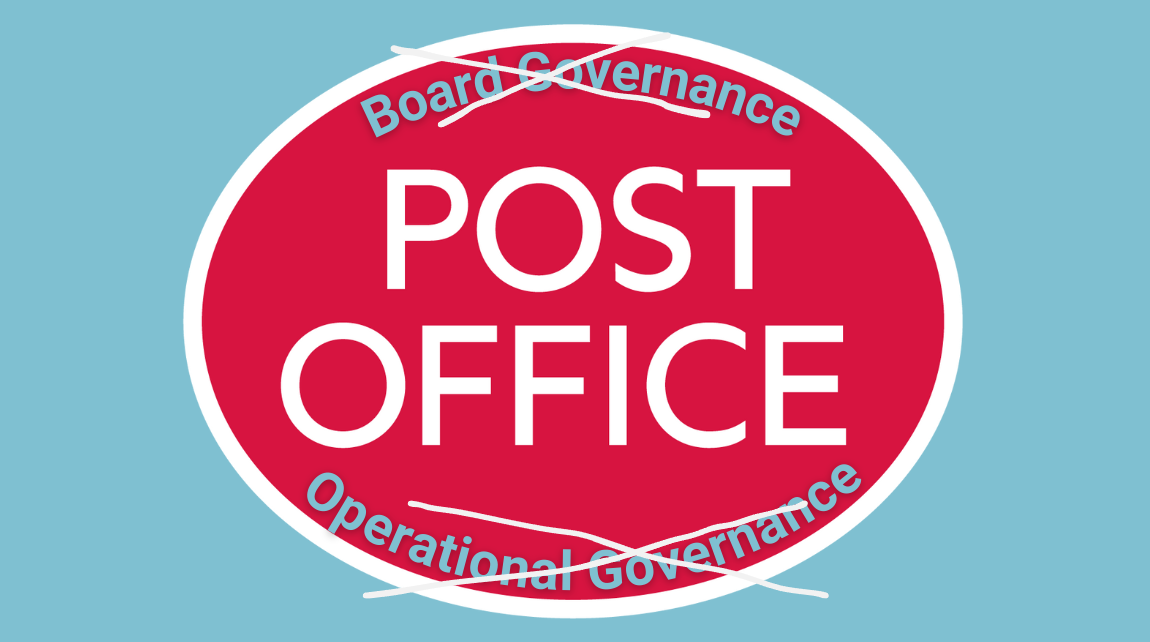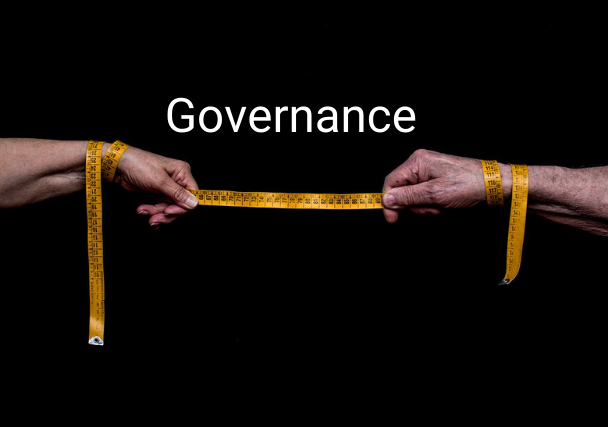
Sunday Brunch: the Post Office scandal - a failure of operational governance
Governance starts with the board in setting the culture of the company. But execution is key.
Governance starts from the top - at the board level - in setting the culture of the company, but execution throughout the organisation is key.
Back in my investment banking days I remember receiving a call from a client, that I had serviced for years and had a great relationship with, asking me to stop calling him. For a split second I thought "sh*t! what did I do?" but then my client proceeded to tell me, with a slight jokey lilt in his voice, that I and my analyst colleagues combined were providing 25% of ALL of my bank's resources into the client as a whole. This was based on a call his Chief Investment Officer had received from our head of sales.
Long story short, the issue was that two of our analysts had been selecting the 'bespoke email' option on the time management system for generalised emails they were sending to all of their clients. Worth the equivalent of a 30 minute call, the data was actually suggesting that these analysts were engaging with clients 48 hours per day.
The underlying problem was the assumption that the data from the system was a fair reflection of what was happening in reality and management were relying on that to make decisions. You'll be pleased to know that I continued to call my client and add value to their investment process!
Something we introduced in a recent Sunday Brunch is that operational governance is often overlooked.

One of the most significant governance failures in recent memory occured with the postal service in the UK, The Post Office which exemplifies that sometimes even when a system is followed and followed to the letter, the wrong outcomes still happen. The issue? The system and oversight of that system.
The Post Office scandal involved faulty software, provided by Fujitsu and known as Horizon, creating false shortfalls in the accounts of thousands of sub-postmasters. It has been described it as one of the most widespread miscarriages of justice in British history. Between 1999 and 2015, over 900 sub-postmasters were convicted of theft, fraud and false accounting based on faulty Horizon data, with about 700 of these prosecutions carried out by the Post Office.
There is no doubt that there was a governance issue but often when we think about governance failures we tend to focus on board governance. I would certainly ask the question of whether it made sense that more than 900 sub-postmasters were really stealing from the Post Office? That would say something incredible about the culture if it were so. Where were the questions being asked by the board to test the reasonableness of the claims?
Nearly all of the blog from here onwards comes from Dr Mimi Ajibadé, a sustainability/ESG and corporate governance expert with over 20 years’ experience and founder of Cogent Governance. Mimi brings a unique perspective in understanding the interlinkages between leadership and operations; between board governance and operational governance.
So I shall leave you in Mimi's excellent hands as she dives into the topic using The Post Office as a case study, and come back with a conclusion at the end.
If you want to read the rest and are not already a member...

What is operational governance?
Operational governance is the way organisations do things and make decisions that ensure clear responsibility, accountability and transparency, creating a culture of good governance where ethical conduct is a key check and balance. Operational governance interacts with managerial processes to ensure managing has a firm governance foundation. Operational governance is part of corporate governance or business governance or organisational governance. It differs in that it exists within the operational aspect of the business.
Operational governance is not the same as management. Management is about planning, organising, leading and controlling the activities of an organisation to achieve its objectives. Operational governance is about setting the standards, policies, procedures and values that guide those activities and ensure they are aligned with the organisation's mission, vision and goals.
Operational governance is also not the same as board governance. Board governance is about overseeing the strategic direction, performance and risk management of an organisation. Board members are usually non-executive directors who are independent from the management team and may represent the interests of shareholders and other stakeholders. Board governance is about ensuring that the organisation is well-led, well-run and well-controlled.
How does operational governance differ from board governance?
Board governance and operational governance are both important aspects of corporate governance, but they have different scopes, functions and challenges. Board governance focuses on the big picture, while operational governance focuses on the details. Board governance relies on information, reports and audits from management and external sources, while operational governance relies on direct observation, feedback and data from operations. Board governance sets the tone at the top, while operational governance enforces/sets the tone at the bottom.
Creating that distinction helps us understand more about the Post Office scandal and how it unfolded over two decades. The scandal revealed that there was a serious gap between board governance and operational governance at the Post Office, which allowed a culture of denial, cover-up and blame-shifting to persist.
The Post Office case study
The Post Office insisted that Horizon was robust and reliable, despite many sub-postmasters reporting problems with the system. The Post Office failed to disclose its knowledge of faults in Horizon while securing convictions. The Post Office also failed to investigate or address the complaints and concerns raised by sub-postmasters or their representatives. The Post Office pursued aggressive legal action against sub-postmasters who challenged Horizon or refused to repay non-existent debts.
A Tale of Two Operational Governance Failures:
Firstly, the Post Office scandal exposed a failure in operational governance at multiple levels. The Post Office failed to ensure that Horizon was fit for purpose, that it was properly tested, monitored and maintained, that it had adequate controls and safeguards, that it had clear and fair procedures for resolving disputes and errors, that it had effective communication and feedback mechanisms with sub-postmasters, that it had a culture of trust, respect and support for sub-postmasters, who were its frontline agents and partners.
Secondly, the Post Office also failed to ensure that its executives were accountable for their actions and decisions regarding Horizon. The executives were able to manipulate information and influence board members to their advantage. The executives were able to evade scrutiny and responsibility for their role in creating and perpetuating the scandal.
Limitations of Board Governance:
What happened with the board governance? The board members were supposed to oversee the performance and risk management of the Post Office, but they were largely kept in the dark about Horizon's problems. The board members relied on information provided by executives who had a vested interest in concealing or downplaying Horizon's faults. Nonetheless, the board members did fail to question or challenge the executives enough or seek independent verification or assurance about Horizon's reliability. This is even more apparent given the media coverage over the years that would/should have been reported to the board periodically. There’s surely no smoke without fire!
The board members also failed to act on behalf of shareholders and other stakeholders who were affected by Horizon's failures. The board members did not protect or promote the interests of sub-postmasters who were wrongly accused or convicted based on Horizon's data. The board members did not intervene or advocate for sub-postmasters who were facing financial hardship or personal distress because of Horizon's errors. The board members did not hold the executives to account or demand justice for sub-postmasters who were victims of the scandal.
The limitations of board governance were evident in the Post Office scandal. The board members were not able to see beyond what the executives wanted them to see. The board members were not able to get past the insider control that the executives exercised over Horizon and its implications. The board members were not able to fulfil their duty of care and fiduciary responsibility to the Post Office and its stakeholders.
Lessons learned and recommendations
The Post Office scandal has been a wake-up call for the need to improve operational governance in organisations. Operational governance is not a technical or administrative issue, but a strategic and ethical one. Operational governance is not a secondary or optional aspect of corporate governance, but a primary and essential one. Operational governance is not a matter of compliance or convenience, but a matter of culture and commitment.
We should be mindful of the following:
- Clear delegations of authority from executive level down to the most junior of staff
- Clarify and educate executive on their governance roles in organisations, as distinct from their management roles
- Active monitoring and review of governance practices by adding governance expertise to internal audits
- Understand that corporate culture needs to embed good governance and ethical practices, this will need the infusion of governance expertise in building culture.
- Ensuring that corporate strategy has sound governance and ethical values as its backbone
The Post Office scandal has also highlighted the importance of aligning and integrating board governance and operational governance. Board governance and operational governance are interdependent and complementary, not separate and conflicting. Board governance and operational governance need to work together to ensure that organisations are well-led, well-run and well-controlled.
Thank you so much Mimi. Back to me...
Conclusion
Back in my PW/PwC days on audit jobs, one of the big tasks was the review of internal controls. The purpose of an audit is to form a view on whether the financial position of a business at a particular point in time is fairly reflected in the financial statements, when taken as a whole. In conducting an audit, we had to get a good understanding of the business's activities, the economy and industry in which it operated and the risks the business faced - those risks are where the internal controls come in: the processes and measures that the business has to mitigate those risks. The review was identifying and assessing those to see whether they could facilitate the ability of the business to present a true and fair reflection of the financial position of the company. These internal controls pervaded the business across many different levels of seniority (and juniority).
Even broader than internal financial controls, ISO standards are designed to ensure the quality, safety and efficiency of products, services and systems. At Curation where I was CEO, we attained ISO 9001:2015 certification. Applying for it and then maintaining required a lot of effort from pretty much everyone at the firm. But we saw an almost immediate improvement in the efficiency with which the business operated - fewer errors, better working capital management, better decisions - which became crucial as we scaled.
Governance starts from the top - at the board level - in setting the culture of the company, but execution - operational governance - is key.
I'll leave Mimi with the final words on The Post Office scandal.
It has been a tragedy for many sub-postmasters who suffered injustice, hardship and trauma because of Horizon's failures. The Post Office scandal has also been an opportunity for learning, reform and improvement in operational governance for organisations. The Post Office scandal has shown us that operational governance matters, and that we can do better.

Guest author: Mimi Ajibadé
Mimi is a sustainability/ESG and corporate governance expert with over 20 years’ experience. She founded Cogent Governance to fill the gap in knowledge and expertise regarding the social and governance dimensions of ESG, which are her key areas of expertise. She also advises on geopolitics and corporate governance as related to the People’s Republic of China (PRC). She has held several senior roles as a corporate and subsidiary governance expert FTSE 50 listed companies, large and SME private companies, and not-for-profits.
She wrote her first corporate social responsibility statement over 15 years ago for Paladin Resources Plc an upstream oil and gas company with equity investments and operations in the matured fields of the North Sea and Java. She also worked in Beijing at one of China’s first and foremost carbon trading companies, Arreon Carbon Limited, Beijing.
She is a Fellow of the Chartered Governance Institute and holds a PhD in corporate law and governance, with a case study focus on PRC listed companies. She has written both feature and technical articles on corporate governance practice in the Governance Magazine. She mini-blogs and writes articles about sustainability.
Until recently, Mimi was a Trustee of the Royal Institute of International Affairs (Chatham House) for seven and half years. There, she chaired the Next Generation Committee promoting and integrating youth inclusion and was a member of the Finance Committee and Nominations Committee and the EDI Champion sitting on the Equalities, Diversity & Inclusion Panel.
She is proficient in written and spoken Mandarin, with working knowledge of Yoruba, and some Hausa.
Something a little more bespoke?
Get in touch if there is a particular topic you would like us to write on. Just for you.
Contact us
Please read: important legal stuff.


